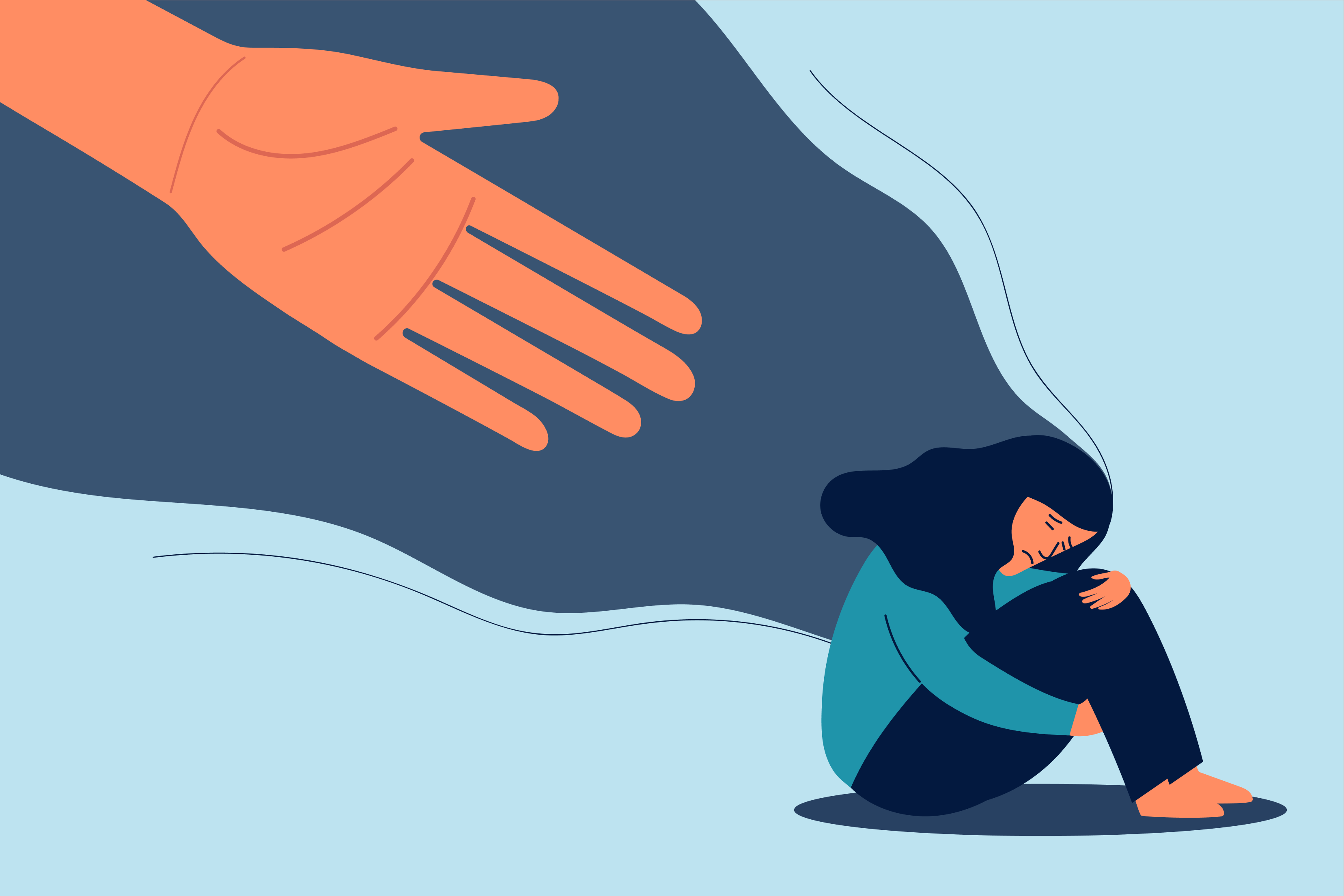Experiencing Loneliness in the Modern Era

Over the past twenty years, numerous studies have shown that loneliness is a significant public health concern. For instance, evidence indicates that the risk of developing and dying from heart disease is influenced by the strength of one's social network, and recently widowed individuals have a higher likelihood of dying. Additionally, people with Alzheimer's who have more extensive social networks maintain better cognitive function, even at more severe stages of the disease.
The emerging themes and issues of loneliness include the challenges in defining loneliness's multidimensional nature, evidence highlighting its importance as a public health issue, how it differs from solitude, and suggestions for overcoming and coping with loneliness.
Examples of Loneliness
Many of us have experienced loneliness at some point in our lives. It can be temporary, triggered by specific events or transitions, or a constant presence.
Bert, an 84-year-old man, has been housebound since his wife passed away shortly after their 60th anniversary. Despite neighbors helping with shopping and maintaining his home, Bert feels overwhelmed with emptiness, especially at night or when reminded of his wife.
On the other hand, Joan, a 19-year-old university student, finds it challenging to make friends and feels isolated despite being surrounded by peers who seem to enjoy their university experience.
These examples illustrate how loneliness can stem from losing connections or struggling to form new ones.
Emily White, author of "Lonely: Learning to Live with Solitude," criticizes society and media for exacerbating loneliness, especially during holidays like Valentine's Day, which can amplify feelings of isolation.
John Steinbeck's novel Of Mice and Men poignantly portrays loneliness. The characters, such as George, Lennie, Crooks, Candy, and Curley's wife, each grapple with their forms of loneliness, highlighting the multifaceted nature of the condition.
Steinbeck skillfully depicts various aspects of loneliness, a concept increasingly recognized by scientific and medical literature as having many dimensions.
Defining Loneliness
The more we study loneliness, the easier it seems to describe rather than define it.
A decade ago, Kenneth Cramer and Joanne Barry from the University of Saskatchewan studied seven popular self-rating measures of loneliness. They found these measures grouped into four factors: social loneliness, emotional loneliness, negative emotions, and family loneliness.
Richard Booth, a psychology professor and psychotherapist, discussed in a Medscape paper whether loneliness should be included in the Diagnostic and Statistical Manual of Mental Disorders. He emphasized its complexity and multidimensional nature, noting that lonely individuals differ significantly and require tailored approaches.
Booth highlighted several factors contributing to loneliness, including poor social skills, situational isolation, unrealistic expectations, dysfunctional attachment history, certain thinking styles, and specific beliefs about events and others' behavior. He and other researchers agree that loneliness is an intense feeling. The UK mental health charity MIND defines loneliness as "an overwhelming feeling of separateness at a deep level."
Booth concurs, noting that the intensity of loneliness can dominate one's thoughts, leading to feelings of misery, emptiness, and hollowness.
A controversial theory from evolutionary psychology suggests that social connection is essential for survival, and our brains are hard-wired for regular social contact. In "Loneliness: Human Nature and the Need for Social Connection," John T. Cacioppo and William Patrick argue that social isolation can harm health, such as smoking or inactivity. They propose that human brains evolved to process social information and enhance survival through collaboration.
Cacioppo and Patrick also explain that loneliness can create a vicious cycle, distorting perception and thinking, leading to mistrust, withdrawal, and increased isolation. However, the need for social connection drives isolated people to form parasocial relationships with TV characters or pets.
A report from the UK charity Age Concern (now Age UK) supports this, stating that almost half of over-65s consider the TV their primary source of company.
Loneliness and Health
The Age Concern report indicates that loneliness is becoming an epidemic among older people in the UK, with more than one in ten over 65 feeling lonely "always" or "often."
Mervyn Kohler, special adviser to Age UK, told The Times that loneliness in old age often results from bereavement, ill health, and poverty. He noted that more older people live alone due to bereavement, leading to isolation, self-neglect, and fewer opportunities to make new connections. He also mentioned that the disappearance of local services like corner shops and post offices reduces social interactions, diminishing self-esteem and leading to depression and related health problems.
American loneliness expert James J. Lynch agrees that social disconnection harms health. In his book "A Cry Unheard: New Insights into the Medical Consequences of Loneliness," he describes loneliness as a silent epidemic in the US, leading to depression and early death. He notes higher mortality rates for divorced, single, and widowed individuals across all demographics.
Lynch believes that dialogue is essential for health and that social isolation in childhood can lead to severe diseases and premature death in adulthood. He also thinks that while technology like the Internet connects us more, it may increase loneliness and related health issues.
Recent research suggests that loneliness affects our genes. Steven Cole of the University of California found that chronic loneliness changes gene behavior, increasing inflammation and decreasing antibody production and antiviral activity. This genetic pattern is specific to loneliness, not depression or other negative feelings.
In a study in Taiwan, Cole linked these genetic changes to the stress hormone cortisol failing to suppress inflammation-related genes, a risk factor for heart disease, cancer, and other conditions.
Cacioppo and Patrick propose that some people are genetically predisposed to loneliness, considering it a genetic disease. They cite a study by the University of Chicago and the Free University in Amsterdam, which found that 48% of identical twins and 24% of non-identical twins reported similar levels of loneliness, suggesting a genetic link.
Loneliness and Solitude
While there isn't a universal definition of loneliness, we understand what it isn't. Solitude, a voluntary state of being alone, differs from loneliness, which involves feeling alone even when surrounded by others.
Voluntary solitude can offer a respite from the noise of modern life and foster creativity and inner reflection, as Anthony Storr emphasizes in his book Solitude: A Return to the Self. Storr challenges the notion that human relationships are the sole source of health and happiness, highlighting the importance of individual experiences and creativity.
Booth agrees, noting that solitude can lead to personal growth through activities like meditation and listening to music. He also highlights the importance of social connections' quality rather than quantity, noting that some lonely individuals have extensive networks but lack satisfying relationships.
Research is challenging the idea that single people are inherently lonely. A study by psychologists from Lafayette College and the University of Miami found that single people over 40 who have never married can be as resilient and happy as their married counterparts. This challenges the belief that marriage is always best for one's health and happiness.
Bella DePaulo, author of "Singled Out: How Singles are Stereotyped, Stigmatized and Ignored and Still Live Happily Ever After," notes that single life has evolved, and individuals can lead fulfilling lives without marriage. She suggests that early research often grouped single individuals with widowed or divorced individuals, leading to misconceptions about single life.
Dealing with Loneliness
If you find yourself lonely and know it's not voluntary solitude, here are some suggestions from the UK mental health charity MIND:
- Dedicate time and effort to understanding the reasons behind your loneliness and take positive steps to address them.
- Learn to be comfortable and relaxed in your own company, facing any complicated feelings that arise.
- Self-reflection may change how you relate to others, reducing the neediness for relationships and increasing your capacity to give.
- Develop social skills such as assertiveness and boundary-setting, and gradually engage in interactions with others.
- Take small steps, such as initiating light conversations with strangers or joining local interest groups or classes.
- Consider volunteering or seeking counseling or psychotherapy to explore and address underlying issues.
Remember, loneliness is a normal part of the human experience, and there's no need to feel ashamed or alarmed by it. Opening up about loneliness can lead to a broader and more open discussion about this shared experience.




